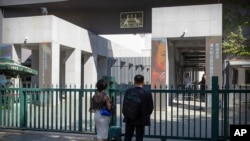China is engaging in a so-called "tongue war" against Australia as an example to other countries, according to analysts. Relations have deteriorated in recent years over allegations of Chinese interference in Australian politics and cyberespionage. There's been disagreement over Beijing's military expansion in the South China Sea and democracy in Hong Kong. Canberra's call for a global investigation into the origins of the new coronavirus — first detected in the Chinese city of Wuhan — was interpreted as an infuriating slight against China.
Political tensions hit new lows Monday when China's Ministry of Foreign Affairs posted a doctored image of an Australian soldier holding a bloody knife to the throat of a child. It was a provocative reference to a recent report that detailed alleged atrocities perpetrated by Australian special forces in Afghanistan.
Canberra angrily demand an apology for the "shameful" tweet, but Beijing accused Australia of attempting to "stoke domestic nationalism." Chinese diplomats said the "rage and roar of some Australian politicians and media" was an overreaction.
Resetting ties with its biggest trading partner will not be easy for Australia. But experts believe that quiet, sensible diplomacy can eventually repair the damage, and that Australia should not have reacted in such a combative way to China's war crimes tweet.
"Surely, we do not want an enemy that is that strong and powerful in the world, you know, even if they are doing things at the moment that we really do not agree with or like," said Jane Golley, director of the Australian Centre on China in the World at the Australian National University. "I am going to continue to believe that there is scope for an engagement strategy that reduces the long-term risks and bringing benefits, you know, to the millions of people here and the billion or 1.4 billion people over there as well. We are all humans after all. But I still do not think that antagonistic approach is the best one for the years ahead."
Trade with China has underpinned Australia's recent prosperity. Forty percent of its exports have been sold to Chinese buyers, and Australia is a source of food and strategic minerals, including iron ore.
But recent diplomatic disputes have coincided with China imposing tariffs and restrictions on a range of products, including wine, barley, beef and coal that could cost Australia billions of dollars in lost revenue.
China also warned its citizens not to travel or study in Australia because of fears of racism fueled by COVID-19.
In 2014, former Australian Prime Minister Tony Abbott said Australia-China relations were characterized by "fear and greed."




